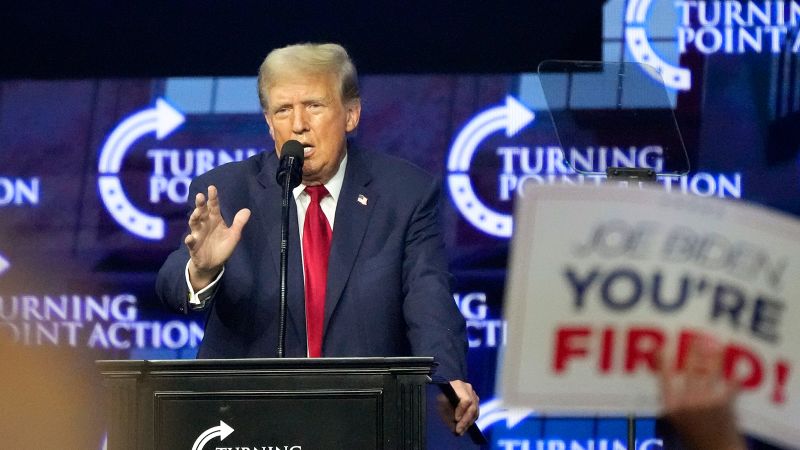Carlos Osorio/AP
Former President Donald Trump speaks at a campaign event in Detroit on June 15, 2024.
Editor's note: Dean Obeidallah, a former lawyer, is the host of the daily show “The Dean Obeidallah Show” on SiriusXM Radio. Follow him on Threads. The opinions expressed in this commentary are his own. Read more opinions on CNN.
CNN —
The New York Times published a story on Sunday detailing how a broad network of Democratic Party officials, progressive activists and watchdog groups are “taking extraordinary steps to prepare for President Trump's reelection.”
An example is Washington Governor Jay Inslee's push to turn the state into a haven where women can freely seek abortions without fear of prosecution. The article also mentions organizations preemptively hiring new auditors in case Trump directs the Internal Revenue Service to target the group in a second term.
On the one hand, we should applaud these government officials and organizations for understanding that Donald Trump's return to the White House poses a special threat to our democratic freedoms. But the only sure way to prevent Trump from overthrowing the government in his campaign of retaliation and preventing his supporters from taking top federal positions and spearheading his far-right agenda is to defeat Trump this November. We should focus all our efforts on keeping the barbarians outside the gates, not figuring out how to mitigate the damage once they're inside.
Trump has been telling anyone who will listen what his dark goals are for his second term, from mass deportations to building massive detention camps for immigrants to expanding presidential powers, as well as a deeply disturbing pledge to “liberate” America from those who are not loyal to him.
The first time we heard the phrase was in a 2023 speech at the Conservative Political Action Conference (CPAC), where Trump promised his supporters that he would be their “revenge.” Trump then vowed to target Democrats, the “Fake News Media,” Republicans in name only, globalists, and anyone else who disagrees with him, shouting, “We will liberate America from these thugs and scoundrels forever.” Trump has repeated this pledge to “liberate” the country from those who disagree with him, including at a rally in Wisconsin last month.
Have you ever heard an American politician talk about “liberating” the country from Americans who simply disagree with them politically? My guess is you haven't, because no politician has ever led either of the major parties by vowing to be a dictator on “day one” and then claiming, “From then on, I'm not a dictator.”
Frankly, the forms of resistance employed to thwart the policies of President Trump's first term are unlikely to work against this embittered, convicted felon who is bent on retaliation and purging America of those who will not submit to him.
Even the strategy of using the courts to stall Trump's second-term policies, detailed in a New York Times article on Sunday, is much less likely to succeed this time around, in part because Trump's first term allowed him to confirm more than 200 federal judges, including three Supreme Court justices he personally appointed.
Consider how federal judge Eileen Cannon, a Trump appointee, has delayed the prosecution of President Trump over allegations that he possessed classified documents, with critics accusing her of furthering Trump's strategy to delay the trial until after the election.
And now the country is watching as the Republican-leaning Supreme Court tries to delay a decision on Trump's claim of total immunity, preventing him from being prosecuted before the November election on charges related to his attempt to remain in power despite losing the 2020 election.
From a legislative perspective, if Trump wins and MAGA Republicans take control of the House and the Senate, we can expect to see him realize many of the right-wing policy dreams he has long craved. This will not be like Trump's first term, when some Republicans rose up to block his radical policies, most famously the late Arizona Senator John McCain voting to block Trump's repeal of Obamacare.
Subscribe to our free weekly newsletter
Nearly every Republican who dared to stand up to President Trump has either left Congress or succumbed to his undemocratic rule. Of the 10 House Republicans who voted to impeach President Trump in January 2021 for inciting the January 6th insurrection, only two remain in Congress (Rep. Dan Newhouse of Washington state and Rep. David Valadao of California).
Republicans in the Senate have also caved. Senator Mitt Romney, a vocal critic of Trump, is retiring in January. Even Republican Senate Minority Leader Mitch McConnell, who blasted Trump on the Senate floor after the January 6 attack, saying there is “no question that President Trump is practically and morally responsible for the events of that day,” met with Trump last week and declared the meeting “totally positive.” But even if Trump doesn't have a Republican-controlled Congress, there's no limit to the damage he could do to the country in a second term. There will be few limitations to restrain him.
That's why a second-term resistance strategy would only divert resources from the more pressing issue at hand: preventing Trump from winning a second term. This is the number one priority — in fact, the only real priority — that we should focus on. Nothing else matters.



